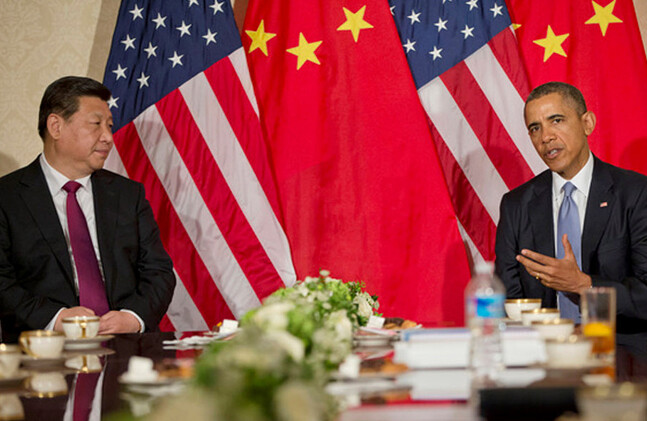At the end of March 2015, the commander of the U.S. Pacific Fleet told an audience in Canberra that "China is creating a great wall of sand" in the South China Sea. He warned that the course it pursues in addressing its maritime disputes "will be a key indicator of whether the [Asia-Pacific] region is heading towards confrontation or cooperation." In an April 9 press conference, meanwhile, Chinese Foreign Ministry Spokeswoman Hua Chunyin conceded—for the first time, according to veteran China watcher Bonnie Glaser—that at least some of China's land reclamation on Mischief Reef serves military purposes. A week later, the French government released satellite imagery showing that China is building a roughly 10,000-foot-long runway on Fiery Cross Reef. China claims the United States is feigning concern over China's maritime activities to isolate the mainland: observes a recent Xinhua editorial, "deeper U.S. involvement in the South China Sea issue and its…efforts to drive wedges between China and some Southeast Asian nations are aimed at strengthening its military presence in the Asia-Pacific region."
Given these developments, it is natural to fear that a miscalculation at sea could spiral into an armed confrontation between the United States and China; some observers, such as the University of Pennsylvania's Avery Goldstein, have even ventured that such a clash could involve nuclear weapons. To their credit, the two countries are taking steps to preempt destabilizing contingencies. In November 2014, for example, the U.S. Department of Defense and the Chinese Ministry of National Defense signed a memorandum of understanding on "rules of behavior for safety of air and maritime encounters" and another on "notification of major military activities."
While the escalatory potential of China's maritime disputes is foremost on many observers' minds, the greatest long-term threat to U.S.-China relations may be something far less vivid: the gradual weakening of economic, and especially trade, interdependence between the two countries. Aside from the sobering historical record—conflicts between leading powers and rising ones have often culminated in disaster—that interdependence has arguably done more than any other phenomenon to furnish a rationale for sustained cooperation between the United States and China, whose relationship lacks the sorts of organic factors that dissuade many other pairs of countries from contemplating conflict: shared values, comparable systems of governance, and compatible understandings of history, to name a few.
As China's economic growth becomes more consumption-driven (consumption accounted for 51.2 percent of growth in 2014, up roughly three points from 2013), it will become less dependent on exports to the United States. While China's exports to the United States nearly quintupled between 2000 and 2014—going from $100 billion to $467 billion—the share of China's exports going to the United States went from two-fifths to a fifth. The rebalancing of China's economy is occurring slowly, but it is gaining momentum. Services, for example, are playing a greater role: while they accounted for 39 percent of China's GDP in 2000, they made up just over 48 percent in 2014. Furthermore, by launching the Asian Infrastructure Investment Bank, the Silk Road infrastructure fund, and other economic initiatives in the Asia-Pacific, China is positioning itself to secure a growing fraction of the export contribution to its growth from within the region.
Granted, interdependence is neither a panacea nor a monolithic phenomenon. In some categories, in fact, U.S.-China relations would benefit from reduced interdependence. China has amassed $3.73 trillion of foreign-exchange reserves, for example, including some $1.22 trillion of U.S. securities. At first glance those numbers would seem reassuring. After all, a Chinese decision to liquidate a substantial fraction of its dollar holdings might induce the United States to reduce its imports of Chinese goods—and vice versa; this symmetric liability should, theoretically, compel each country to exercise restraint. Still, as Larry Summers observed over a decade ago, when China's reserves were only in the vicinity of $450 billion, "it surely cannot be prudent for [the United States]…to rely on a kind of balance of financial terror to hold back reserve sales that would threaten our stability." Constructs of mutually assured destruction—whether in the economic realm or in the nuclear realm, as during the Cold War—are vulnerable to miscalculations.
Another problematic arena of interdependence is cyberspace: as the integration of the world's information networks and technologies grows, so does the vulnerability of each country's companies and government agencies to penetration by individual agents or more sophisticated hacking units. The ongoing challenge of attributing attacks—and, most importantly in the U.S.-China context, determining which of them has either the tacit sanction or direct support of the leadership—raises concerns about misunderstandings in cyberspace. Not surprisingly, the U.S. Defense Department says that one of the objectives of its new cyber strategy is to "[s]trengthen…cyber dialogue with China to enhance strategic stability."
As Brookings Institution scholar Thomas Wright explained in a Fall 2013 essay, the multiplicity of interdependence between the United States and China poses a challenge: "in the hope of achieving a greater degree of stability," he asked, "do they want to use interdependence between them to maximize the leverage that each has over the other, or do they want to reduce this leverage (and some types of interdependence)?" Wright argues that "unwinding financial imbalances" and "safeguarding each nation's technological infrastructure as much as possible" would reduce U.S.-China interdependence in ways that benefit the two countries' relationship.
A comparable reduction in their trade interdependence, however, would be inimical to its progression. That phenomenon cannot prevent the United States and China from going to war; only the prudence of their leaders can do so. Still, it can continue to play a role in preventing strategic competition from devolving into unalloyed rivalry. This sort of proposition tends to elicit a cautionary invocation of Norman Angell, the Nobel Peace Prize-winning author of the 1910 book The Great Illusion. According to the prevalent understanding of that text, Angell believed "the extraordinary interdependence of the modern financial world" rendered war between Britain and Germany impossible. In truth, Angell believed war was a near certainty. He had no hope for a treaty that would constrain their naval race; nor did he foresee a unilateral decision by one country to withdraw from the race that would induce the other to follow suit. Instead, Angell concluded that Britain and Germany would accelerate their contest, "which, if unchecked, [would] lead with every probability to war."
Angell did argue, however, that Europe's unusual degree of interdependence would make war futile, a judgment borne out by the deaths of some 20 million people and the destruction of three empires during World War I. Chinese President Xi Jinping channeled that logic at the opening ceremony of last July's Strategic and Economic Dialogue: "China and the United States, when combined, account for a third of the world's economic aggregate, a quarter of the world's population, and a fifth of total global trade. In addition, our interests are more than ever interconnected….If we are in confrontation, it will surely spell disaster for both countries and the wider world."
There are at least three reasons not to despair. First, the reduction in U.S.-China economic interdependence is occurring gradually. Second, there are some counterbalancing phenomena. In particular, because China's reliance on energy imports is poised to increase sharply over the coming decades, China will place a growing premium on stability throughout the global maritime commons—commons that are principally underpinned by U.S. military power. Third, the United States has considerably more time to shape the rise of China, a competitor-cum partner that is challenging today's order incrementally, than Britain did a century earlier to respond to the aggression of Germany, an antagonist that sought to upend the prevailing balance of power in Europe.
Still, over the long term, as China's comprehensive national power approaches America's, and its economic dependence on the United States declines, both its aversion to a military confrontation and its concern about posing more systemic challenges to liberal world order are likely to diminish. It will also become more difficult for America's allies in the Asia-Pacific to reconcile growing military and diplomatic ties with the United States, on the one hand, and growing trade and investment relations with China, on the other. U.S.-China cooperation in such circumstances will become both more difficult and more imperative.




